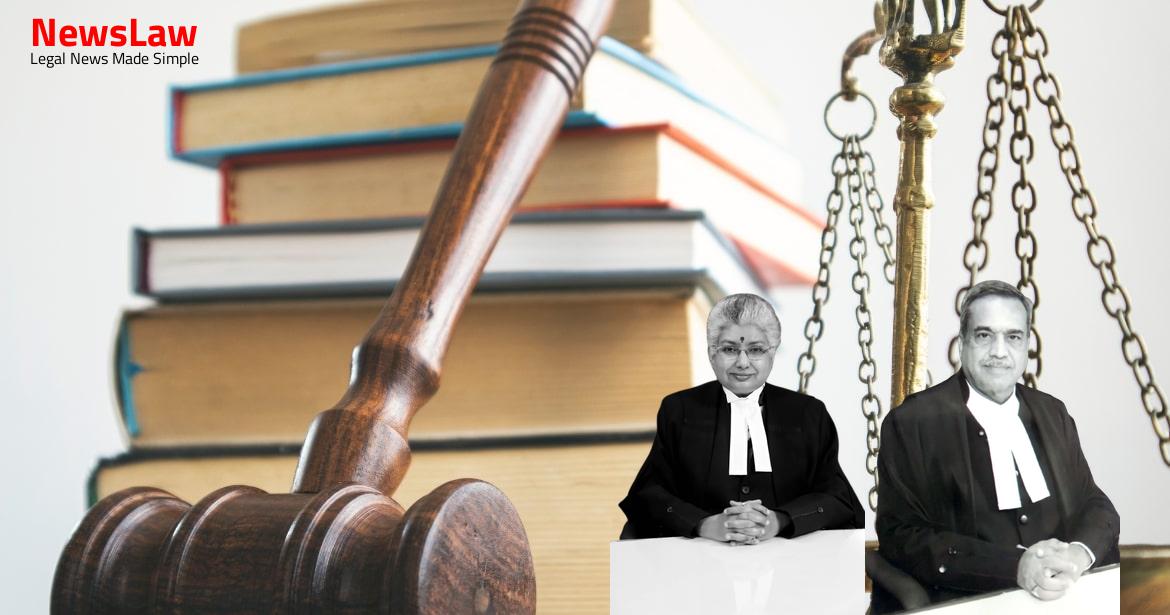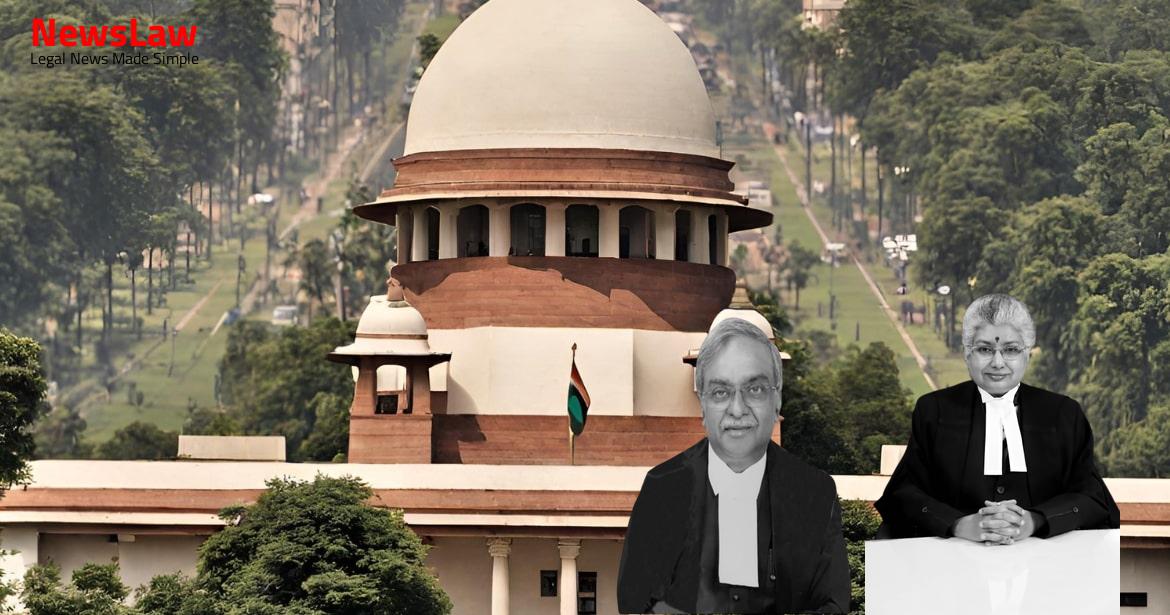The legal case involves a complex dispute over land valuation and compensation following its acquisition for a spinning mill. The High Court’s detailed legal analysis considered factors such as the impact of historic events, the reliability of sale deeds, and the method of determining market value. The court’s decision on the annual increase rate, deductions for development charges, and assessment of land value based on past transactions highlights the intricacies of such legal matters. Let’s delve deeper into the legal nuances of this case.
Facts
- The High Court allowed the appeals of the Spinning Mill reducing the amount of compensation and determining the value of acquired land at Rs.88,400/- per acre.
- The High Court considered the Sale Deed Ex.AW6/C as a base for determining the value of the acquired land and added 12% annual increase.
- A 15% cut was imposed by the High Court instead of the 25% adopted by the Learned Reference Court.
- The appeals of the Spinning Mill were partly allowed, while the appeals of the original landowners for enhancement of compensation were dismissed.
- The present appeals were filed by the original landowners against the High Court’s judgment, which determined the value of the acquired land at Rs.88,400/- per acre.
- Special Leave Petition No.9470 of 2010 granted.
- Original claimants and Spinning Mill appealed the common Judgment and Award by the Reference Court which enhanced compensation to Rs.1,12,000/- per acre from Rs.25,000/- per acre.
- Land owners argued for higher compensation due to the land’s potential for commercial, residential, and industrial use as it is situated on the main Bhatinda Mansa Road.
- Bhatinda Integrated Co-operative Cotton Spinning & Ginning Mills Ltd. has been ordered to be wound up with a Liquidator appointed.
- The land acquisition was for establishing the Spinning Mill.
- No appeal by original claimants against the High Court’s decision reducing compensation for the Spinning Mill.
- Civil Appeal Nos. 9185-9196 of 2017 and Nos. 9895-9897 of 2017 relate to RFA Nos. 2642, 2643, 2644, 2645, 2646, 2648 of 1999 and RFA Nos. 1505, 1508, 1509, 1510, 1515, 1516 of 1999.
- RFA No. 2648 of 1999 was filed by original claimants for compensation enhancement.
- RFA No. 1505 of 1999 filed by Bhatinda Integrated Co-Operative Cotton Spinning & Ginning Mills Ltd. not challenged.
- Special Leave Petition No. 15117 of 2010 also granted.
Also Read: Judicial Review of Delayed Writ Petition
Issue
- Courts below applied annual increase at a flat rate of 12% instead of a cumulative rate.
- High Court adopted a cut/deduction of 15% when determining the value of the land acquired.
Also Read: Ownership Dispute: Legal Analysis on Admission and Decree
Arguments
- Land owners are seeking a higher compensation rate based on a sale deed from 1981.
- They argue that a cumulative rate of increase should be applied, not a flat rate.
- The liquidator of the spinning mill opposes the appeals, stating that no cut in compensation should be made due to the land’s location and purpose of acquisition.
- The acquired land was for a profit-making enterprise, and no deduction should be made from the market price.
- The land was semi-urban and surrounded by factories and residential areas, justifying no deduction for development charges.
- Compensation granted to the land owners is already on the higher side.
- Submission that there should not be any deduction at all may not be accepted.
- Sale deed dated 04.05.1981 was for a small portion of land against the total land acquired, hence not representative.
- Cut of 15% towards development charges does not require interference as the land was acquired for industrial purpose.
- No interference of this Court is called for considering the oral facts and circumstances of the case.
Also Read: Interpretation of Statutory Limitation under Section 263(2)
Analysis
- In the case of Lal Chand vs. Union of India, it was held that the Court must ensure no adverse circumstances before adopting a standard escalation for valuation.
- The State of Punjab faced militancy from 1979 to 1992, causing a significant exodus and plummeting land prices to around Rs.25,000 per acre.
- Referring to Rameshbhai Jivanbhai Patel case, the practice of collecting year-to-year increase in market value from pre-acquisition transactions was noted.
- The Lal Chand case reiterated that even transactions 2 to 3 years prior to acquisition must be examined for adverse circumstances before applying standard escalation in valuation.
- The annual increase/escalation ought to have been at a maximum rate of 10% in the present case.
- Due to the impact of militancy in Punjab from 1979 to 1992, granting an escalation/price rise at the rate of 12% is not justified.
- Using a sale or acquisition from a distant time as a reference for determining market value may be unreliable and unsafe.
- Courts should exercise caution when relying on sale deeds with a significant time gap from the date of acquisition notification.
- It is advisable to adopt cumulative increase rather than a flat rate for determining market value.
- Using nearby land values from previous years as a reference is considered reasonably safe when the gap is only a few years.
- However, beyond a certain timeframe, relying on such references may become unsafe, even if it relates to neighbouring land.
- The increase in land value should have been adopted on a cumulative basis.
- The land was acquired in 1988 but only operational in 1992 and went into liquidation in 2003.
- No interference needed in the 15% deduction for development charges.
- Sale deeds for small portions of land were rightfully discarded, but the significant instance of sale dated 24.07.1979 was considered for a 15% cut due to the land being acquired for a spinning mill.
Decision
- The entire amount of compensation as determined by the High Court has been paid.
- No order as to costs has been issued.
- The relevant time the land was considered as agricultural land.
- There is no reason to interfere with the common Judgment and Order passed by the High Court.
- The appeals have been dismissed accordingly.
- All appeals fail and deserve to be dismissed based on the reasons stated above.
- It is prayed to dismiss the present appeals.
Case Title: RAMESH KUMAR Vs. BHATINDA INTEGARATED COOPERATIVE COTTON SPINNING MILL (2021 INSC 466)
Case Number: C.A. No.-003875-003876 / 2009



